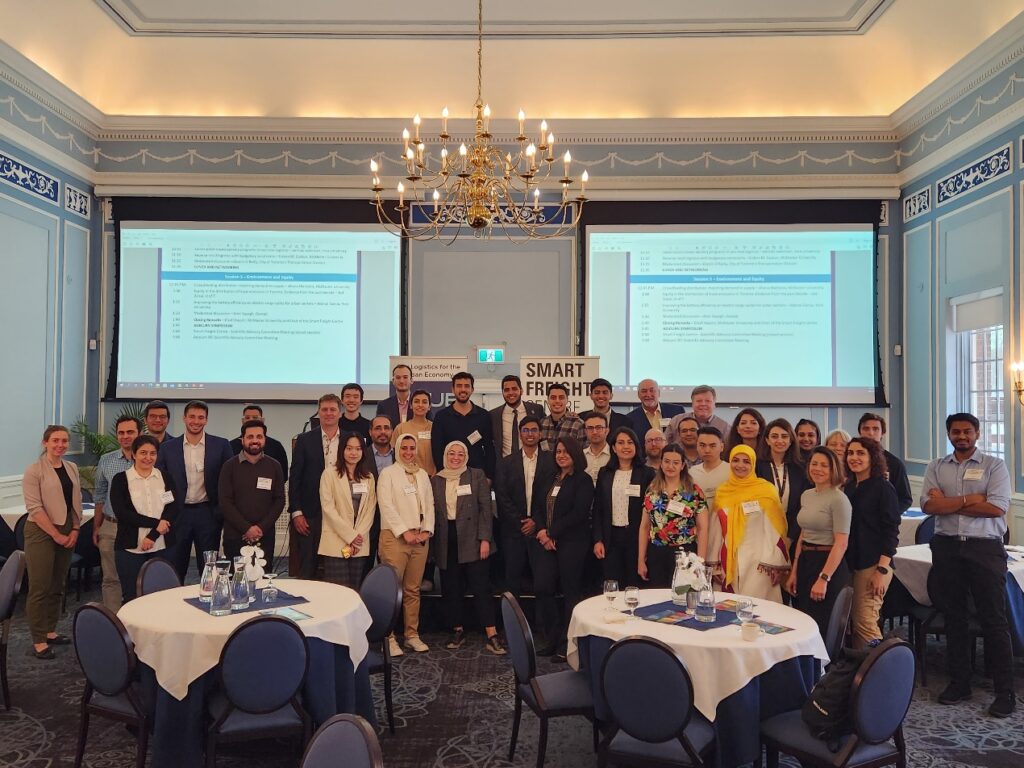Second Annual Symposium for City Logistics for the Urban Economy

The City Logistics for the Urban Economy (CLUE) hosted a dynamic three-session symposium showcasing the research done in the last year. The symposium was done with the Smart Freight Centre, a collaboration between researchers at McMaster University, Toronto Metropolitan University, University of Toronto, York University, and government and private sector stakeholders in the Greater Toronto and Hamilton Area (GTHA). The symposium had over 55 attendees from academia and industry partners. The symposium began with Professor Matt Roorda of the University of Toronto giving a welcome speech and an update on the research done in the previous year. Afterward, the first session started.

Session 1 – Freight Data Analytics for Safety and Emissions
Moderator: Dr. Judy Farvolden, University of Toronto Mobility Network
The first session was moderated by Dr. Judy Farvolden, the founding managing director of Mobility Network at the University of Toronto. Three speakers shared their research findings:
- Prateek Jain, a Master’s student from York University, presented his work on freight fluidity on arterial roads and its correlation with collisions. Jain’s presentation highlighted the vital objective of eliminating traffic fatalities and severe injuries while promoting safe, healthy, and equitable mobility for all.
- Nishit Bhavsar, a Ph.D. candidate from McMaster University, showed his research on a risk index for hazardous material transport in the Peel region.
- Carlos Rivera, a Postdoctoral Fellow from the University of Toronto, focused his presentation on a freight emissions monitoring approach for freeways in the GTHA. Rivera addressed the long-standing need to make freight data accessible for fact-based analysis, thereby enhancing the movement of goods while mitigating environmental impacts.

Session 2 – Efficiency and Technology
Moderator: Doolin O’Rielly, City of Toronto Transportation Services
In the second session, graduate students shared their research on efficiency and technology. Doolin O’Rielly from the City of Toronto’s Transportation Division moderated this session.
- Farrah Ghizzawi, a Ph.D. Candidate from the University of Toronto, presented her work on robot-assisted deliveries in urban areas. The presentation highlighted the role of innovative technology in improving the reliability and efficiency of last-mile deliveries. Ghizzawi et al. developed a simulation tool for evaluating the performance of a person-following robot operating in crowded and complex areas.
- Behnaz Naeimian, a Ph.D. student from York University, explored the effect of service offering frequency in last-mile deliveries, focusing on the potential benefits of consolidating orders to reduce delivery costs in online grocery shopping. Naeimian et al. research demonstrated the benefits of adopting a consolidated delivery schedule compared to a same-day delivery service.
- Erdem Coskun, a Postdoctoral Fellow from McMaster University, showed his work on retail reverse supply chain optimization, investigating the process and structure of retailers’ product returns to warehouses. Coskun et al. developed a mathematical model to minimize the costs associated with the supply chain and inventory.

Session 3 – Environment and Equity
Moderator: Amir Sayegh, Geotab
The final session, moderated by Amir Sayegh from Geotab, addressed critical research on environmental sustainability and equity in freight transportation systems. Three speakers shared their research findings
- Ahana Malhotra, a Ph.D. Candidate from McMaster University, shed light on the challenges of food waste and food insecurity. Her research developed an optimization problem to match supply and demand in crowd-feeding, involving volunteers as stakeholders in the delivery process of food banks. Malhotra’s work showcased the potential of leveraging optimization algorithms to enhance the distribution of food resources efficiently.
- Jad Zalzal, a Ph.D. Candidate from the University of Toronto, presented his research on equity in the distribution of truck emissions in Toronto. Zalzal et al. findings highlighted spatial and temporal trends in truck and light-duty vehicle emissions, examining their relationship to environmental justice. Additionally, he assessed the impact of various policy scenarios on environmental justice indicators.
- Adonai Garcia, a Master’s student from York University, shared his research on electric cargo cycles for urban centers. Garcia began his presentation by discussing the results of a three-month pilot conducted in British Columbia, during which operational attributes such as speed, weight, and the number of deliveries were collected. He then presented his model results and compared them to the pilot data.

The symposium brought together a diverse group of researchers and industry professionals fostering collaboration and knowledge exchange. The presentations showcased the immense potential of freight research in addressing critical challenges faced by the transportation industry, including safety, efficiency, emissions, and equity. As the symposium drew to a close Dr. Elkafi Hassini, professor from McMaster University and chair of the Smart Freight Centre, gave his closing remarks thanking all the attendees and organizers of the event.

See the full CLUE 2023 Symposium Agenda, and access speakers’ shared presentation files.
